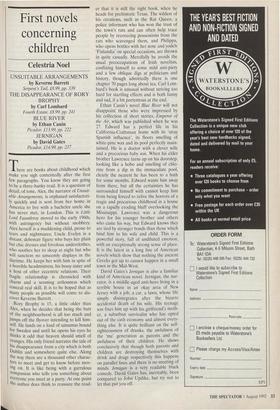First novels concerning children
Celestria Noel
UNSUITABLE ARRANGEMENTS by Keverne Barrett Serpent's Tail, 1'8.99, pp. 339 THE DISAPPEARANCE OF RORY BROPHY by Carl Lombard Fourth Estate, 1'8.99, pp. 241 BLUE RIVER by Ethan Canin Picador, f13.99, pp. 222 JERNIGAN by David Gates Picador, £14.99, pp. 237 There are books about childhood which make you sigh contentedly after the first few paragraphs. You know they are going to be a three-hanky read. It is a question of detail, of tone. Alex, the narrator of Unsuit- able Arrangements, is orphaned satisfactori- ly quickly and is sent from her home in America to live with a bachelor uncle she has never met, in London. This is Little Lord Fauntleroy moved to the early 1960s, with astringency but without snobbery. Alex herself is a maddening child, prone to tears and nightmares; Uncle Evelyn is a distant, debonair figure who buys her plain but chic dresses and frivolous underclothes, who soothes her to sleep at night but who will sanction no unseemly displays in the daytime. He keeps her with him in spite of a horrible headmistress, his bossy sister and a host of other eccentric relations. Their fragile relationship is chronicled with charm and a seeming artlessness which conceal real skill. It is to be hoped that as many people as possible will come to dis- cover Keverne Barrett.
Rory Brophy is 15, a little older than Alex, when he decides that being the butt of the neighbourhood is all too much and Jumps off the flyover intending to kill him- self. He lands on a load of satsumas bound for Sweden and until he opens his eyes he thinks it odd that heaven should smell of oranges. His only friend narrates the tale of his disappearance from a city which is both Dublin and somewhere quite else. Along the way there are a thousand other charac- ters to meet and get to know before mov- ing on. It is like being with a garrulous companion who tells you something about everyone you meet at a party. At one point the author does think to reassure the read- er that it is still the right book, when he heads for prehistoric Texas. The wildest of his creations, such as the Rat Queen, a police informant who has won the trust of the town's rats and can often help trace people by recovering possessions from the rats who scavenged them, and Philippa, who opens bottles with her nose and yodels Tinlandia' on special occasions, are thrown in quite casually. Mercifully he avoids the usual preoccupations of Irish novelists, confining himself to some mild anti-piety and a few oblique digs at politicians and history, though admittedly there is one chapter 70 pages long about tea. Carl Lom- bard's book is unusual without striving too hard for startling effects and is both funny and sad, if a bit portentous at the end.
Ethan Canin's novel Blue River will not disappoint those who were impressed by his collection of short stories, Emperor of the Air, which was published when he was 27. Edward has a perfect life in his California-Craftsman home with its 'stray Spanish influence', its floors smelling of white-pine wax and its pool perfectly main- tained. He is a doctor with a clever wife and a precocious baby son. When his elder brother Lawrence turns up on his doorstep, looking like a hobo and smelling of chlo- rine from a dip in the immaculate pool, clearly the nearest he has been to a bath for some months, Edward wants him away from there, but all the certainties he has surrounded himself with cannot keep him from being forced to relive the horrors of a tragic and precarious childhood in a house on a rapidly eroding bluff overlooking the Mississippi. Lawrence was a dangerous hero for his younger brother and others who came his way, but Edward knows they are tied by stronger bonds than those which bind him to his wife and child. This is a powerful story, full of undiluted emotion, with an exceptionally strong sense of place. It is the latest in a long line of American novels which show that nothing the ancient Greeks got up to cannot happen in a small town in the Mid-West.
David Gates's Jernigan is also a familiar kind of American novel. Jernigan, the nar- rator, is a middle-aged anti-hero living in a terrible house in an okay area of New Jersey with a job, a car, a lawn, whose life simply disintegrates after the bizarre accidental death of his wife. His teenage son fixes him up with his girlfriend's moth- er, a suburban survivalist who has opted out of the cash economy and almost every- thing else. It is quite brilliant on the self- righteousness of drunks, the awfulness of the 'me' generation as parents and the awfulness of their children. He shows conclusively that though both parents and children are destroying themselves with drink and drugs respectively this happens on parallel lines and there is no meeting of minds. Jernigan is a very readable black comedy. David Gates has, inevitably, been compared to John Updike, but try not to let that put you off.


















































 Previous page
Previous page